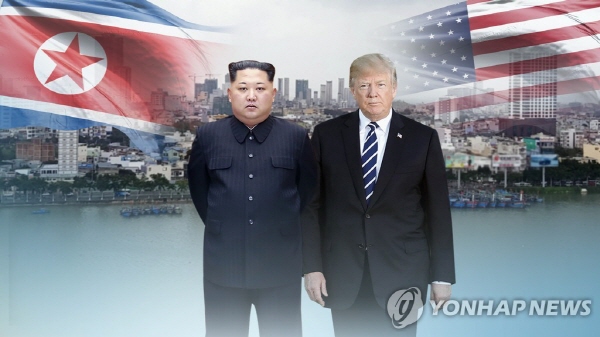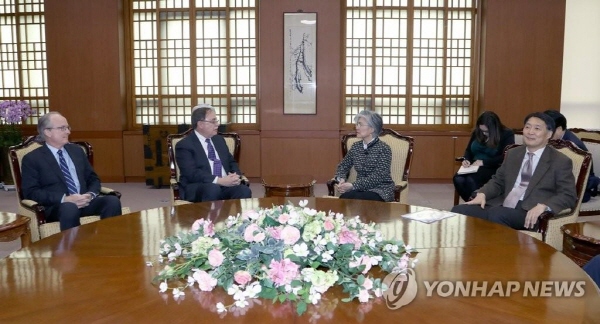When Lee Jong-duk closed his plant in Qingdao, China, and moved it to an industrial park in North Korea's border town of Kaesong in 2008, he was full of hope and pride, believing he could contribute to deepening inter-Korean relations through business.
Business was quite robust, with his underwear-making factory employing as many as 350 North Korean workers at one point. The high-quality and relatively cheap products also appealed to customers, and sales were at their highest point in years in 2015.
It, however, hit an unexpected snag in early 2016, when the government abruptly shut down the park, ordering all South Korean businesspeople to leave Kaesong immediately. What appeared to be a short-term hiccup has turned three years this week with no clear signs for an end to the stalemate.
"I thought that it would return to normal soon as that had been the case before. But as days became months, I realized this time would be different," he said. "I had no choice but to open factories in Vietnam and Goyang (north of Seoul) in August that year to prevent the business from going under."
Launched in 2004, the industrial park in Kaesong was born on the back of a peace mood created after the first-ever inter-Korean summit between then South Korean President Kim Dae-jung and then North Korean leader Kim Jong-il in 2000.

It was hailed as a symbol of inter-Korean economic cooperation and a successful cross-border project that combined South Korean capital and technology with cheap labor from North Korea.
The operation, however, came to an abrupt halt when the Seoul government announced in February 2016 it would shut it down to punish the North for its nuclear and missile provocations. About 120 companies, including Lee's, were operating there when the closure was announced.
Many saw it as yet another short-term suspension, expecting it would return to normal soon.
It was not the first time the industrial complex had been closed, with its operations suspended for about five months in 2013, and a few days of disruptions was not unusual as it could not be free of the ups and downs of inter-Korean relations.
The 2016 shutdown, however, was different. Some businesspeople said it was like a "military operation" as the process was swift and resolute.
The South Korean government informed the businesspeople of the closure on short notice and gave them just one day to pack and leave. It also accused the North of using a large portion of the money flowing into the complex for its weapons development.

Speculation swirled that the decision was made by a few top government officials without consultations with the unification ministry handling inter-Korean affairs. Some officials reportedly claimed they would have opposed the decision had they known about it in advance.
A group of businesspeople who once operated plants in the Kaesong Industrial Complex stands in front of a government building in central Seoul on Jan. 9, 2019, with a placard calling for state approval for a trip to the North Korean border town to check assets they left behind. (Yonhap)
Choi Dong-jin, who operated a garments-making plant in Kaesong, remembers vividly when the government hastily arranged a meeting and informed them that an official announcement would be made in a few hours.
His Kaesong plant once employed around 700 North Korean workers.
"I didn't expect at all the government to tell us that the park would be closed," he said. "We were so perplexed with some of us making high-voiced protests against the decision. I did not expect that the shutdown would last this long. I thought it could be just a few months but not this long, three years."
He and other businesspeople were buoyed when the leaders of the Koreas agreed in September to "normalize" the operation of the complex, along with a tour program to Mount Kumgang on the North's east coast, which was also suspended in 2008, as soon as conditions are met.
North Korean leader Kim raised the hope further by affirming in his New Year's Day address last month that he is willing to open the two inter-Korean projects without preconditions.
Little headway has since been made, however, raising worries that their hope won't be realized this time either. At the center of the stalemate are a global sanctions regime that bans any economic dealing with North Korea.
North Korea wants sanctions relief as corresponding measures for the steps it has taken since their June summit, such as dismantling a nuclear and missile test site. Washington demands more concrete denuclearization steps before making such a concession.
Full-blown inter-Korean cooperation has been stymied by Seoul's concerns over potential violations of tightly woven nets of sanctions against Pyongyang.
The government's recent rejection of a trip request by a group of businesspeople to Kaesong could be a reminder of how concerned it is about sanctions.
This marked their seventh unsuccessful attempt to visit the industrial complex to check their dust-gathering equipment left behind when they hurriedly evacuated.
All eyes are now turning to what the outcome from the upcoming second summit between U.S. President Donald Trump and North Korean leader Kim will be, which is set for late this month in Hanoi, Vietnam.
Observers cautiously say that Washington could use the Kaesong and Mount Kumgang tour cards as bargaining chips in coaxing North Korea to take more denuclearization steps.
Subtle but positive signals from Washington were detected in a recent speech by a top U.S. nuclear negotiator.
"We didn't say we won't do anything until you do everything," Stephen Biegun, special representative for North Korea, said during a lecture at Stanford University, hinting at the possibility that the U.S. could relax sanctions before North Korea's denuclearization.
Biegun recently came back from a trip to Pyongyang for summit preparation talks.
Businesspeople, including Choi and Lee, aspire to see the expectations turn into reality this time, praying that it would not be yet another "false hope" as has been the case before.
"We are pinning hope on the summit between the U.S. and North Korea," Choi said. "However, it is very hard to stand. ... Hope goes up and then down over and over again. Now it has become torture for us."
Their belief remains unchanged that the Kaesong Industrial Complex is not just a business site but a major ground for constant cross-border contacts, which they think is very important in building trust and laying the groundwork for reunification between the Koreas.
"(The Kaesong park) has an enormous impact in helping us meet, recognize and communicate with each other. It goes beyond political rhetoric. It can serve as a path toward reunification through interaction, not through political rhetoric," Choi said.
Lee shared the view, saying that no matter what, the Kaesong industrial park should open its door again.
"Without the Kaesong park, there will be no hope for peace and unification," he said. "The Kaesong park will serve as a harbinger for peace. The industrial park should be up and running again no matter what, and I am sure that it is a trend that we can't go against from a political and historical perspective."

